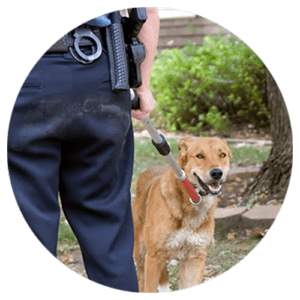A pet license is more than just a tag; it’s a symbol. It represents ownership, a quick trip home if a pet gets lost, animal welfare, helping local animals in need, and, in some communities, proper vaccination and adherence to public health guidelines.
Pet licenses can save pet lives. By requiring pet owners to license their pets, communities can effectively manage and control the population of stray and lost animals, reduce the risk of disease outbreaks, and provide vital funding for animal shelters, all while encouraging accountability among pet owners.
Paying a “fee” to place an ID tag on a pet’s neck isn’t a tax, it’s a funding source for the care of local animals. However, compliance rates remain alarmingly low despite the importance of licensing. Pet license fees account for significant shelter funding in some communities. Still, only 23% of dogs (and 7% of cats) are licensed in compliance with mandatory registration laws, posing challenges to the sustainability of animal shelters and the continued welfare of their furry inhabitants.
In a perfect world, all the pets in your community would hold a valid license, but let’s imagine a world where an already low compliance rate is reduced to 0%. To accurately depict this reality, we went right to the source– an animal shelter.
Insufficient Shelter Funding
 When shelters struggle to meet the increasing demand for their critical services, it can leave more strays and animals at risk and even force shelters to limit their resources and turn away animals, exacerbating the problem further. “If a stray animal comes in injured, we can provide them with lifesaving medical care. Licensing fees truly make a positive impact on the animals in our community,“ says Heidi Wilkins, Manager of Community & Shelter Services at Peterborough Humane Society (Ontario, Canada).
When shelters struggle to meet the increasing demand for their critical services, it can leave more strays and animals at risk and even force shelters to limit their resources and turn away animals, exacerbating the problem further. “If a stray animal comes in injured, we can provide them with lifesaving medical care. Licensing fees truly make a positive impact on the animals in our community,“ says Heidi Wilkins, Manager of Community & Shelter Services at Peterborough Humane Society (Ontario, Canada).
License fees play a crucial role in keeping many shelters running. Without them, they would struggle to support stray animals in need and essential services, such as medical treatments, vaccinations, and finding loving homes for animals in their care. It is important to recognize that the allocation of license fees varies from community to community. Still, the overall impact of licensing is clear: it plays a crucial role in supporting the critical work that animal shelters are doing.
“Licensing brings funding into the shelter that allows us to expand our services and help more stray and abandoned animals.”
Strays and animals in need rely heavily on animal shelters for care, food, medical attention and rehoming efforts. Many animal shelters face significant challenges in raising the funds required to provide lifesaving services for pets in their care. For some shelters, these services would be impossible to provide without the support of license fees. “If a stray animal is not claimed, the [license] fees help make sure the animal has all it needs to get ready for adoption. This includes, but is not limited to, core vaccinations, deworming, flea treatments, spay/neuter and microchipping,” says Wilkins.
These kinds of initiatives benefit both animals and people in the community. “Licensing is important because it allows us to know how many animals are in the community and what services they may need,” says Wilkins. Educating about responsible pet ownership and the importance of spaying/neutering and licensing helps prevent future instances of stray animals and overcrowded shelters, creating a more compassionate society towards animals. “Our shelter assists with not only the animals that come in as strays but initiatives that impact other pet owners in our community, such as our low-cost spay/neuter clinic, rabies and microchip clinics and educational programming.”
Limited Community Support
 A pet license is not only a ticket home for a pet if they get lost, but in some areas, it also maintains the community’s safety by enabling shelters to work hand-in-hand with Animal Control Officers (ACOs). ACOs ensure the safety of the community by working with law enforcement agencies to investigate animal abuse and neglect cases and implement animal laws. “These fees contribute to our ability to have our ACOs out in the community,” says Wilkins.
A pet license is not only a ticket home for a pet if they get lost, but in some areas, it also maintains the community’s safety by enabling shelters to work hand-in-hand with Animal Control Officers (ACOs). ACOs ensure the safety of the community by working with law enforcement agencies to investigate animal abuse and neglect cases and implement animal laws. “These fees contribute to our ability to have our ACOs out in the community,” says Wilkins.
“Licensing fees truly make a positive impact on the animals in our community.”
ACOs keep the community safe by investigating reports of dog bites, rabies quarantines, and getting lost pets off the street while limiting the number of animals brought into shelters by helping to reunite lost pets with their owners. “They [ACOs] would be busier with stray animals, or those stray animals wouldn’t have the resources to be picked up and brought into the shelter.”
Crowded Shelters
 Pet license tags are a valuable tool for ensuring that lost pets can be identified and reunited with their owners quickly. In many cases, a lost pet wearing a license tag can be taken straight home, bypassing the need for a trip to the animal shelter altogether. This can help reduce stress and anxiety for both pets and their owners, as well as free up space and resources at local animal shelters. Simply put, when more pets are licensed, the more animals that shelters can provide care for.
Pet license tags are a valuable tool for ensuring that lost pets can be identified and reunited with their owners quickly. In many cases, a lost pet wearing a license tag can be taken straight home, bypassing the need for a trip to the animal shelter altogether. This can help reduce stress and anxiety for both pets and their owners, as well as free up space and resources at local animal shelters. Simply put, when more pets are licensed, the more animals that shelters can provide care for.
“If the community did not license their pets, then we would not be able to help as many animals as we do every year.”
The world without pet licensing would be a much different place. Without this crucial funding source, many animal shelters could not provide lifesaving services to pets in need. The consequences of this would be significant, leaving many pets without the necessary care to survive. By ensuring your pet is licensed, we can avoid this reality and help create a world where all animals have the opportunity to thrive.


